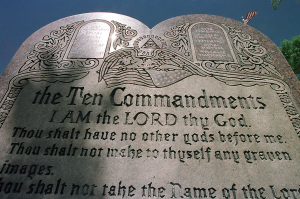Critics: DADT Report Glossed Over Soldiers' Fears of an Open Military
Conservatives have criticized the Department of Defense report, released on the eve of today's congressional hearing, for "glossing over" soldiers' apprehensions and skirting the issue.
When releasing the 257-page report, called the Comprehensive Review of the Issues Associated with a Repeal of Don't Ask, Don't Tell, Defense Department General Counsel Jeh Charles Johnson and Army Gen. Carter Ham said it reveals a military climate that is favorable to homosexual servicemen and women serving their country openly.
Gen. Ham summarized the report Tuesday saying, "Based on all we saw and heard, our assessment is that, when coupled with the prompt implementation of the recommendations we offer below, the risk of repeal of Don't Ask, Don't Tell to overall military effectiveness is low."
The report summarized surveys that questioned 115,052 service members from the U.S. Marines, Army, Navy, Air force, Army Reserves and Coast Guard.
According to the document's executive summary, survey questions consistently showed that 50 to 55 percent of servicemen and women felt that the DADT repeal would have a mixed to neutral effect on soldiers. Another 15 to 20 percent felt there would be a positive effect, and 30 percent felt that it would have a negative effect.
Over 90 percent of service members responded that they felt very good to neutral about their ability to work together with openly gay and lesbian soldiers.
Additionally, 69 percent of respondents acknowledged that they had served closely with a "closeted" homosexual co-worker at some point in their career. Those who reported having that experience described it as having been very good to neutral.
However, critics say the summaries of the survey data have been skewed because "equally positively and negatively" (or mixed) answers and "no effect" responses have been summed together with "positively or very positively" answers to report large favorable reactions to the questions.
Carrie Gordon Earll of policy group Citizen Link commented, "It's a grouping to say that results are positive [when they are not]."
A closer look at the report reveals that nearly 60 percent of combat Marine soldiers said it would affect them negatively to very negatively if they had to work with an openly gay solder in their immediate unit. Similarly, the majority of all Army, non-combat Marine and combat Army respondents also said they would be negatively to very negatively affected by having to work with openly homosexual unit members.
Additionally, accounts of open floor discussions found, "Repeatedly, we heard service members express the view that 'open' homosexuality would lead to widespread and overt displays of effeminacy among men, homosexual promiscuity, harassment and unwelcome advances within units, invasions of personal privacy, and an overall erosion of standards of conduct, unit cohesion, and morality."
Nevertheless, the report concluded, "Based on our review, however, we conclude that these concerns about gay and lesbian service members who are permitted to be 'open' about their sexual orientation are exaggerated, and not consistent with the reported experiences of many service members."
Earll said she is not surprised that the report has been summarized to show a favorable climate for an open military. "We expected that would be the case since that's what President Obama wants," she replied.
As the report noted, Obama stated in a State of the Union address that DADT "denies gay Americans the right to serve the country they love because of who they are." The president has repeatedly called for a legislative end to DADT.
As a result, Earll said the survey wording was crafted as though the 1993 policy was already repealed. None of the questions directly asked soldiers if they wanted the DADT repealed.
Regarding the overwhelming positive response to the question about working together with openly gay soldiers, Earll noted, "These are people who work in the dessert in a fox hole. Of course they're going to make it work."
The Family Research Council faults the DOD's lackadaisical attitude toward the July and October leaks for the report's "compromised" outcome.
In a November 11 statement, FRC President Tony Perkins urged the commission undertaking the report to "launch an immediate investigation into the source of these leaks, which have seriously damaged the credibility of the [Comprehensive Review Working Group]'s process."
"The fact there were leaks means that there were people who want a repeal," Earll agreed.
She fears that soldiers' concerns are being "glossed over."
The FRC is now urging Congress to consider the shortcomings of the report in addition to the report's findings. In a statement released Tuesday, Perkins stated, "Congress should hold extensive hearings on this topic, on both the findings and methodological weaknesses of this report, before taking any action to overturn current law. No level of risk should be acceptable merely to advance a radical social agenda."
The Senate Armed Services Committee is scheduled to hold a hearing to review the Pentagon report beginning Wednesday.



























